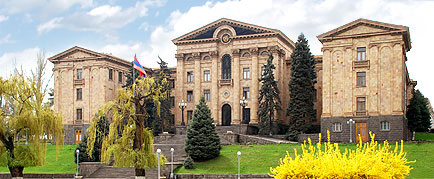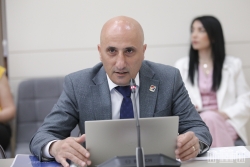The Chairman of the RA Central Electoral Commission (CEC) Vahagn Hovakimyan presented for debate at the NA Standing Committee on State and Legal Affairs the report on the activity of the Central Electoral Commission of the Republic of Armenia for 2022-2023. The issue was debated at April 22 sitting.
In 2022, only elections of the local self-government bodies took place. In March, extraordinary election was held in Vedi community, there was no appeal of results.
On September 25, 2022 elections of the local self-government bodies took place: Elections were held in 17 communities through proportional electoral system. In Alagyaz community the election was through majoritarian electoral system. There was no appeal of results in 18 communities. “Despite the competition, the political struggle, there was no appeal of results. That means that the electoral system effectively worked,” Vahagn Hovakimyan noted.
The rapporteur informed that on December 17, 2022 the term of powers of 38 constituency election commissions terminated and new commissions were formed. 539 persons applied for the vacant position of the constituency electoral commission N 266. Courses were also organized after the professional staff formation process. Special education programme was elaborated and implemented for 10 constituency electoral commissions of Yerevan. Speaking about the elections of Council of Elders, the CEC Chairman referred to the international observers’ assessments, according to which, the elections were held in compliance with the rules of democracy. In case of this election there no application of appeal of results was received.
The CEC Chairman in detail touched upon the importance of organizing courses for the members of the polling station electoral commissions. During the elections of the Council of Elders of Yerevan a proposal was made for organizing courses also for proxies to the political forces. 7 persons out of 14 political forces taking part in the elections made use of the proposal.
It was noted that from the beginning of the year 2023, the digital toolkit of the activity of the Commission was expanded, as a result: numerous documents are presented online.
During the Q&A session, in terms of getting proper knowledge on the organization of the electoral processes, the deputies emphasized the courses organized for the members of the commissions. Reference was made to expediency of the proxies’ training courses, also the possibility of organizing courses for the proxies in the local self-government bodies, the risks of the activity of observation organizations during the elections, the cooperation of the CEC with the international colleagues and other problems concerning the activity of the structure.
The CEC Chairman informed that the proxies’ courses were organized exclusively by the staff. According to him, the state has a duty of organizing elections, and if while organizing the incomplete knowledge of any link can have negative impact on the quality of the elections, then the state should solve that problem. To Vahagn Hovakimyan’s conviction, the experience of Yerevan showed that that method works.
The CEC Chairman informed that the strategy project of the CEC development project is under elaboration, and one of the key approaches is the formation of the civil educational centres functioning on the basis of 28 constituency electoral commissions.
In response to the question of the Committee Chair Vladimir Vardanyan, the rapporteur touched upon the opportunity of the digital voting and in this process – the role of the CEC. It was noted that all the countries, which turned to exclusively digital voting, later returned to paper version. “The digital voting has a big shortcoming: When there is argument, it is not possible to prove, i.e. when there is paper basis, the doubt remains undispelled,” Vahagn Hovakimyan said. He informed that the involvement of the CEC to the digitalization process is the integration of the bases to the future digitalization platforms.




 22.04.2024
22.04.2024 22.04.2024
22.04.2024 22.04.2024
22.04.2024 22.04.2024
22.04.2024 22.04.2024
22.04.2024 22.04.2024
22.04.2024 22.04.2024
22.04.2024
